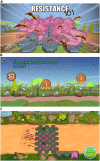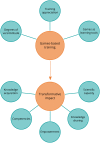Evaluation of a game-based training course to build capacity for insecticide resistance management in vector control programmes
- PMID: 33057401
- PMCID: PMC7561117
- DOI: 10.1371/journal.pone.0240514
Evaluation of a game-based training course to build capacity for insecticide resistance management in vector control programmes
Abstract
Across Africa, malaria control programmes are increasingly challenged with the emergence of insecticide resistance among malaria vector populations. Confronted with this challenge, vector control staff must understand insecticide resistance management, think comprehensively and react positively when confronted with new problems. However, information on the subject is often only available through written guidelines that are difficult to put into practice. Based on the successes and strengths of educational games for health, we developed and evaluated a novel game-based course to fill the gap in training resources for insecticide resistance management. The training was evaluated by analysing results of pre- and post-course knowledge tests and self-efficacy surveys, as well as post-course interviews. At the start of the training, fundamental concepts of insecticide resistance were reviewed through Resistance101, a mobile app game. Subsequently, insecticide resistance management strategies were explored using the simulation game ResistanceSim, which was introduced by mini-lectures and complemented by class discussions and group work. The game-based training was conducted and evaluated in two African countries (Ethiopia and Zambia) using a mixed-methods approach. Quantitative outcome measures included knowledge acquisition and change in self-efficacy. We completed a qualitative inductive thematic analysis of participant interviews to explore the views and experiences of participants with the games and training, and the impact of the training on professional practices and attitudes. The game-based training increased knowledge in the short-term and improved self-efficacy scores. The training increased participants' knowledge base, stimulated knowledge sharing and changed work practices. The game-based training offers scalable training opportunities that could nurture and capacitate the next generation of professionals in vector control.
Conflict of interest statement
I have read the journal’s policy and the authors of this manuscript have the following competing interests: MaC made substantial contributions to study conceptualisation. At this time, MaC was a researcher working for the Liverpool School of Tropical Medicine. Before study implementation, MaC became employed by IVCC, who supported the development of ResistanceSim. While at IVCC, MaC did not contribute to study design or implementation, and her involvement was limited to reviewing, editing, and approving the manuscript. This does not alter our adherence to PLOS ONE policies on sharing data and materials.
Figures






Similar articles
-
ResistanceSim: development and acceptability study of a serious game to improve understanding of insecticide resistance management in vector control programmes.Malar J. 2018 Nov 13;17(1):422. doi: 10.1186/s12936-018-2572-2. Malar J. 2018. PMID: 30424788 Free PMC article.
-
Multi-country assessment of residual bio-efficacy of insecticides used for indoor residual spraying in malaria control on different surface types: results from program monitoring in 17 PMI/USAID-supported IRS countries.Parasit Vectors. 2018 Jan 30;11(1):71. doi: 10.1186/s13071-017-2608-4. Parasit Vectors. 2018. PMID: 29382388 Free PMC article.
-
Bio-efficacy and physical integrity of piperonylbutoxide coated combination net (PermaNet® 3.0) against pyrethroid resistant population of Anopheles gambiae s.l. and Culex quinquefasciatus mosquitoes in Ethiopia.Malar J. 2019 Jul 4;18(1):224. doi: 10.1186/s12936-019-2641-1. Malar J. 2019. PMID: 31272452 Free PMC article.
-
Current vector control challenges in the fight against malaria.Acta Trop. 2017 Oct;174:91-96. doi: 10.1016/j.actatropica.2017.06.028. Epub 2017 Jul 3. Acta Trop. 2017. PMID: 28684267 Review.
-
Malaria Vector Control Still Matters despite Insecticide Resistance.Trends Parasitol. 2017 Aug;33(8):610-618. doi: 10.1016/j.pt.2017.04.006. Epub 2017 May 9. Trends Parasitol. 2017. PMID: 28499699 Review.
Cited by
-
Determining Perceived Self-Efficacy for Preventing Dengue Fever in Two Climatically Diverse Mexican States: A Cross-Sectional Study.Behav Sci (Basel). 2022 Mar 28;12(4):94. doi: 10.3390/bs12040094. Behav Sci (Basel). 2022. PMID: 35447666 Free PMC article.
References
-
- World Malaria report, World Health Organisation, 2018 [cited 2/04/2019]. [cited 01/12/219] https://www.who.int/malaria/publications/world-malaria-report-2018/repor...
-
- World Health Organization. The global Plan for Insecticide Resistance Management, 2012. [cited 2/04/2019] https://www.who.int/malaria/publications/atoz/gpirm/en/
-
- Jason WS, and Lee JJ Climate change games as tools for education and engagement. Nat. Clim 2015. 5 5 413.
-
- Mariani I. (Games telling stories of and for social innovation In Bertolotti E, Daam H, Piredda F, Tassinari V, editors. The Designer as Storyteller: DESIS Network Association–Department of Design, Politecnico di Milano Italy; 2018. pp. V https://archive.org/details/ThePearlDiver_DESIS
Publication types
MeSH terms
Substances
LinkOut - more resources
Full Text Sources
Medical
Miscellaneous

